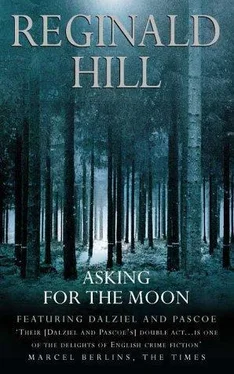Reginald Hill - Asking For The Moon
Здесь есть возможность читать онлайн «Reginald Hill - Asking For The Moon» — ознакомительный отрывок электронной книги совершенно бесплатно, а после прочтения отрывка купить полную версию. В некоторых случаях можно слушать аудио, скачать через торрент в формате fb2 и присутствует краткое содержание. Жанр: Полицейский детектив, на английском языке. Описание произведения, (предисловие) а так же отзывы посетителей доступны на портале библиотеки ЛибКат.
- Название:Asking For The Moon
- Автор:
- Жанр:
- Год:неизвестен
- ISBN:нет данных
- Рейтинг книги:5 / 5. Голосов: 1
-
Избранное:Добавить в избранное
- Отзывы:
-
Ваша оценка:
- 100
- 1
- 2
- 3
- 4
- 5
Asking For The Moon: краткое содержание, описание и аннотация
Предлагаем к чтению аннотацию, описание, краткое содержание или предисловие (зависит от того, что написал сам автор книги «Asking For The Moon»). Если вы не нашли необходимую информацию о книге — напишите в комментариях, мы постараемся отыскать её.
Asking For The Moon — читать онлайн ознакомительный отрывок
Ниже представлен текст книги, разбитый по страницам. Система сохранения места последней прочитанной страницы, позволяет с удобством читать онлайн бесплатно книгу «Asking For The Moon», без необходимости каждый раз заново искать на чём Вы остановились. Поставьте закладку, и сможете в любой момент перейти на страницу, на которой закончили чтение.
Интервал:
Закладка:
All right, so it wasn't the year's most earth-shaking event, but it meant a lot to me. And it must have meant a little to dial hard core of loyal readers who kept on asking for more.
And of course to Andy Dalziel and Peter Pascoe, it meant the difference between life and death!
If time moves so erratically for me, how must it seem to that intermittently synchronous being, the series character? I mused on this the other day as I walked in the fells near my home. I'm not one of those writers who explain the creative process by saying, 'Then the characters take over.' On the page I'm a tyrant, but in my mind I let them run free, and as I walked I imagined I heard the dull thunder of Dalziel's voice, like a beer keg rolling down a cellar ramp.
'It's all right for him, poncing around up here, feeling all poetic about time and stuff. But what about us, eh? Just how old are we supposed to be anyway? I mean, if I were as old as it felt twenty years back when this lot started, how come I'm not getting meals-on-wheels and a free bus pass?'
'You're right," answered Peter Pascoe's voice, higher, lighter, but just as querulous. 'Look at me. When A Clubbable Woman came out, I was a whizzkid sergeant, graduate entrant, potential high-flier. Twenty years on, I've just made chief inspector. That's not what I call whizzing, that's a long way from stratospheric!'
It was time to remind them what they were, figments of my imagination, paper and printers' ink not flesh and blood, and I started to formulate a few elegant phrases about the creative artist's use of a dual chronology.
'You mean,' interrupted Peter Pascoe, 'that we should regard historical time, i.e. your time, and fictive time, i.e. our time, as passenger trains running on parallel lines but at different speeds?'
'I couldn't have put it better myself,' I said. 'A perfect analogy to express the chronic dualism of serial literature.'
'Chronic's the bloody word,' growled Dalziel.
'Oh, do be quiet,' said Pascoe, with more courage than I ever gave him. 'Look, this is all very well, but analogies must be consistent. Parallel lines cannot converge in time, can they?'
'No, but they can pass through the same station, can't they?' I replied.
'You mean, as in Under World, where the references to the recent miners' stride clearly set the book in 1985?'
'Or 1986. I think I avoided that kind of specificity,' I said.
'You think so? Then what about Bones and Silence in which I return to work the February after I got injured in Under World, making it '87 at the latest, yet that book's full of specific dates, like Trinity Sunday falling on May 29th, which set it quite clearly in 1988?'
'You tell him, lad,' said Dalziel. 'Bugger thinks just because he's moved from Yorkshire into this sodding wilderness, he can get away scot-free with stunting our growth.'
'Think of your readers,' appealed Pascoe. 'Don't you have a duty to offer them some kind of explanation?'
'Bugger his readers!' roared Dalziel. 'What about us? Do you realize, if he dropped down dead now, which wouldn't surprise me, he'd leave you and me stuck where we are now, working forever? Is that fair, I ask you? Is that just?'
Lear-like, I was beginning to feel that handing over control wasn't perhaps such a clever idea, but I knew how to deal with such imaginative insurrection. I headed home and poured myself a long Scotch, and then another. After a while I let out an appreciative burp, followed by a more genteel hiccup.
Now I could ponder in peace the implications of what I had heard.
There's no getting away from it – in twenty years, Dalziel and Pascoe have aged barely ten. But the readers for whom Pascoe expressed such concern don't seem to find it a problem. At least, none of them has mentioned it in their usually very welcome letters.
On the other hand a flattering and familiar coda to these letters on whatever topic is a pleasurable anticipation of further records of this ever-diverse pair. But if we are all ageing at twice their rate, there must come a time when…
But suddenly I jumped off this melancholy train of thought. Time can be speeded up as well as slowed down. I write, therefore they are! And what better birthday gift can I give my loyal readers than a quick trip into the future, nothing too conclusive, nothing to do with exit lines and bones and silence, but a reassuring glimpse of Pascoe when time has set a bit of a grizzle on his case, and of Dalziel still far from going gentle into that good night?
So here it is, my birthday gift. 'Bloody funny gift,' I hear Andy Dalziel mutter deep within. 'Have you clocked the price? And look at the length of it! There's more reading round a bag of chips.'
To which Peter Pascoe thoughtfully replies, 'Half-bottles cost more than fifty per cent of the full-bottle price because production costs stay constant. Besides, if this book deletes one tiny item from those endless lists of things unknown and deeds undone which trouble our sleeping and our dying, then it will be priceless.'
Dalziel's reply is unprintable. But, pricey or priceless, unless you've got the brass nerve to be reading this on a bookshop shelf, someone's paid for it. Accept my thanks. Next time, we'll be back to the present. Meanwhile, a very Happy Twentieth Birthday to us all!
Ravenglass Cumbria
January 1990
ONE SMALL STEP
The first man to land on the moon was Neil Armstrong on July 20th, 1969. As he stepped off the module ladder, he said, 'One small step for a man, one giant leap for mankind.'
The first man to be murdered on the moon was Emile Lemarque on May I4th, 2010. As he fell off the module ladder, he said, 'Oh mer-'
There were two hundred and twenty-seven million witnesses.
One of these was ex-Detective-Superintendent Andrew Dalziel who was only watching because the battery of his TV remote control had failed. What he really wanted to see was his favourite episode of Star Trek on the Nostalgia Channel. By comparison, Michelin-men bouncing dustily over lunar slag heaps made very dull viewing, particularly with the Yanks and Russkis leapfrogging each other to the edge of the solar system. But the Federated States of Europe had waited a long time for their share of space glory and the Euro Channel had been ordered to give blanket coverage.
In the UK this met with a mixed response, and not just from those who preferred Star Trek. Britain's decision to opt out of the Federal Space Programme had always been controversial. During the years when it appeared the Programme's best hope of reaching the moon was via a ladder of wrecked rockets, the antis had smiled complacently and counted the money they were saving. But now the deed was done, the patriotic tabloids were demanding to know how come these inferior foreigners were prancing around in the Greatest Show
Off Earth with no UK involvement whatever, unless you counted the use of English as the expedition's lingua franca? Even this was regarded by some as a slight, reducing the tongue of Shakespeare and Thatcher to a mere tool, like Esperanto.
But all most True Brits felt when they realized their choice of channels had been reduced from ninety-seven to ninety-six was a vague irritation which Andy Dalziel would probably have shared had he been able to switch over manually. Unfortunately he was confined to bed by an attack of gout, and irritation rapidly boiled into rage, especially as his visiting nurse, who had retired to the kitchen for a recuperative smoke, ignored all his cries for help. It took a violent splintering explosion to bring her running, white-faced, into the bedroom.
Dalziel was sinking back into his pillows, flushed with the effort and the triumph of having hurled his useless remote control through the telly screen.
'Now look what you've made me do,' he said. 'Don't just stand there. Fetch me another set. I'm missing Star Trek.'
Читать дальшеИнтервал:
Закладка:
Похожие книги на «Asking For The Moon»
Представляем Вашему вниманию похожие книги на «Asking For The Moon» списком для выбора. Мы отобрали схожую по названию и смыслу литературу в надежде предоставить читателям больше вариантов отыскать новые, интересные, ещё непрочитанные произведения.
Обсуждение, отзывы о книге «Asking For The Moon» и просто собственные мнения читателей. Оставьте ваши комментарии, напишите, что Вы думаете о произведении, его смысле или главных героях. Укажите что конкретно понравилось, а что нет, и почему Вы так считаете.












